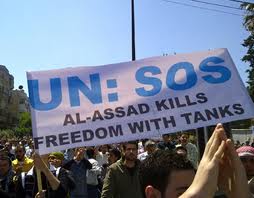 More than 400 people have died in Syria since the Arab League deployed a team of monitors there on Dec. 27, a top U.N. official told the Security Council on Tuesday.
More than 400 people have died in Syria since the Arab League deployed a team of monitors there on Dec. 27, a top U.N. official told the Security Council on Tuesday.
B. Lynn Pascoe, who addressed the council in a closed-door meeting the same day that Syrian President Bashar al-Assad delivered a combative speech in Damascus, cited figures compiled by the U.N. office of the High Commissioner for Human Rights on the basis of accounts by local and international human rights groups.
Susan E. Rice, the U.S. ambassador to the United Nations, said that the rate of killings, about 40 per day, marked an intensification of the crackdown by President Bashar al-Assad’s government since the period preceding the Arab League initiative.
“Syria, rather than using the opportunity of its commitment to the Arab League to end the violence and fulfill all of its commitments, is stepping up the violence despite the presence of monitors,” she said.
Rice said the United States is concerned by “reports that at least two of the monitors of the Arab League today — two Kuwaitis — were roughed up, harmed, harassed, hurt, in the context of their work.”
She also denounced the “vitriol of President Assad’s speech today and further belittling by him of the Arab League, which we found offensive.”
The “entire international community, the United States and all members of the Security Council are united in support of the Arab League initiative,” she said.
Syria’s U.N. ambassador, Bashar al-Jaafari, countered that the attacks on the Arab monitors were carried out by armed opposition forces, not by pro-government forces. “There is no Syrian interest whatsoever to harm the credibility and the safety and the security of the Arab envoys,” he said.
Kuwait’s state-run KUNA news agency reported Tuesday that the Kuwaiti observers were attacked in the northern port city of Latakia by “unknown protesters” Monday.
Germany, backed by Britain, sought to ratchet up pressure on Syria, proposing that the Security Council invite Arab League representatives to brief members on their faltering efforts to bring about a reining in of the country’s military.
But most council members, including France, said that the body would need to wait until the Arab League filed a formal report on its findings in Syria before considering any fresh action. “Everybody agrees that for the moment the only game in town in political terms is the Arab League mediation,” French Ambassador Gerard Araud told reporters.
The Security Council has been unable to act on Syria since early October, when China and Russia vetoed a Western-backed resolution threatening possible sanctions against Damascus if it did not stop the violence. Last month, Russia introduced its own resolution calling for political talks between the government and the opposition. But it has since put that initiative on hold until the Arab League concludes its assessment on Jan. 19.
“Patience may be the key word now,” Russia’s U.N. ambassador, Vitaly Churkin, told reporters outside the Security Council.
The United States and the Europeans, however, voiced frustration with the slow pace of Russian diplomacy.
“We think it is long past time that the Council passes a strong resolution that supports the Arab League and all of the elements of the Arab League initiative, including its call for sanctions,” Rice said. “Unfortunately, after a bit of a show last month of tabling a resolution, the Russians inexplicably have been more or less AWOL in terms of leading negotiations on the text of that resolution.”
WP

Leave a Reply
You must be logged in to post a comment.